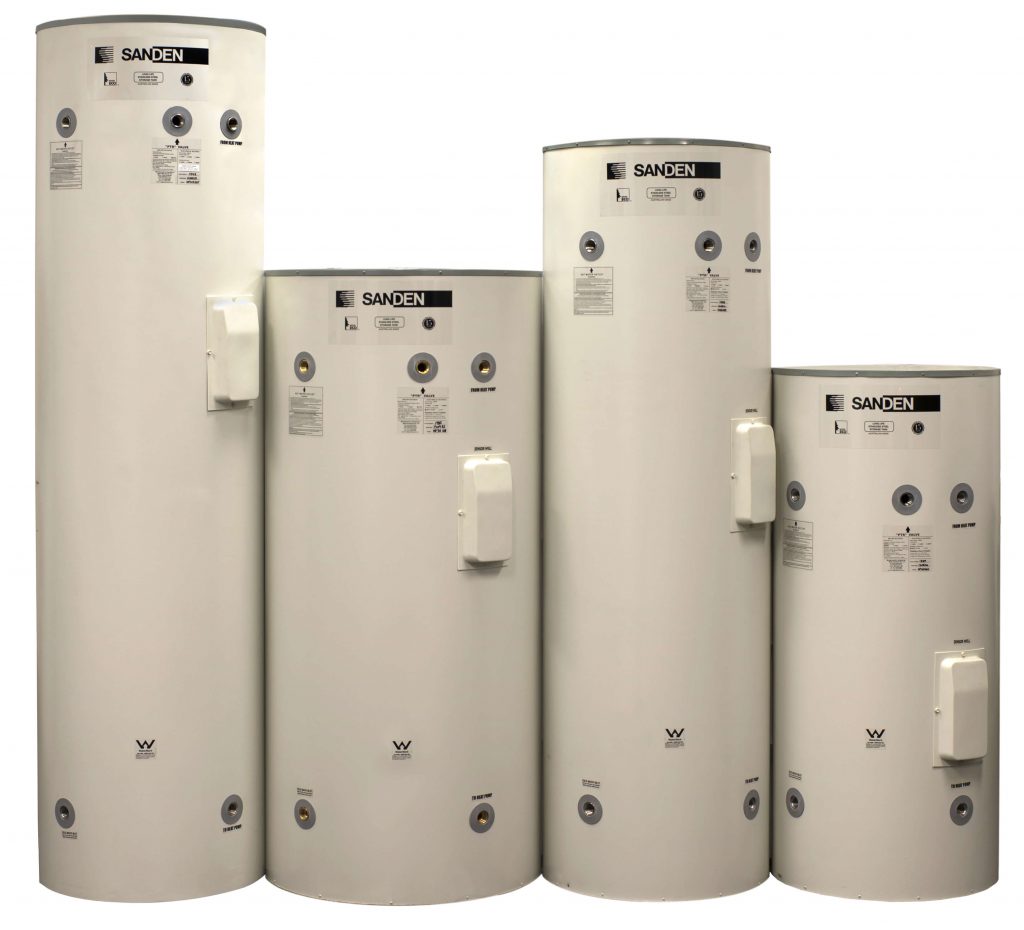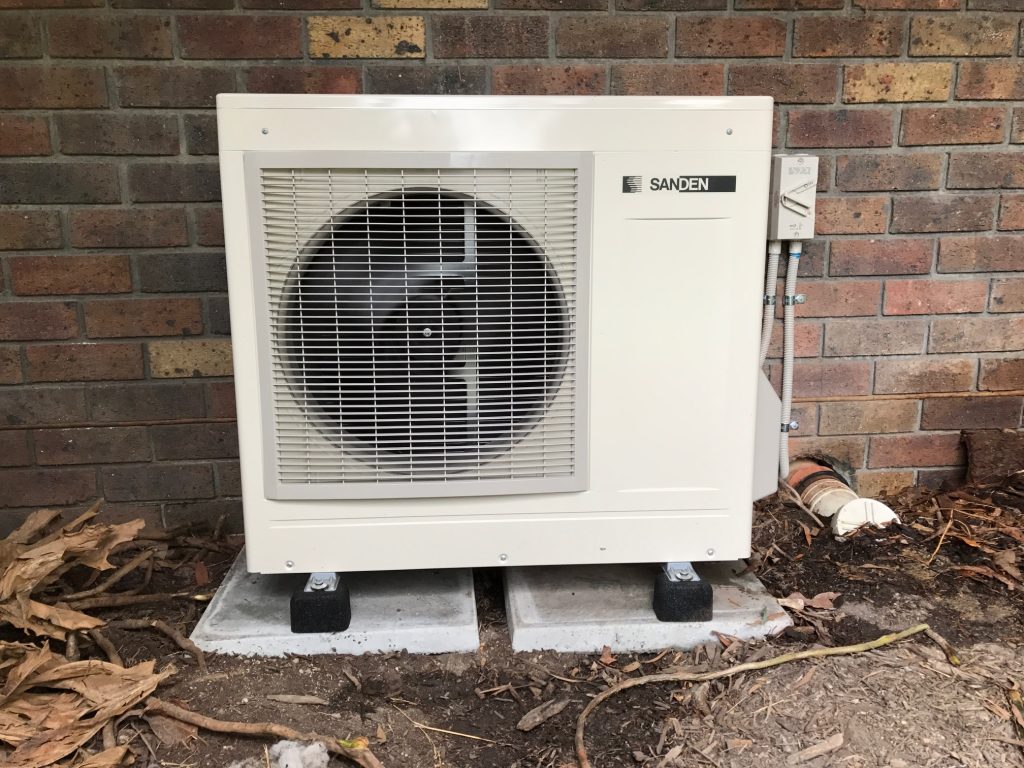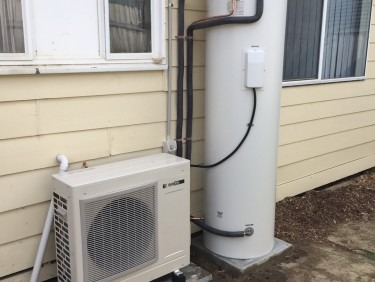
There’s not much point in investing in a system that generates hot water if it’s not placed in a carefully considered location. The hot water system should ideally located near the hot water taps. When the water travels a short distance, your system will respond faster than the ones traveling further. You won’t need to increase the base temperature to compensate for the time the water travels through your pipes. As a result, there will be a reduction in the amount of energy wasted.
Note that a property’s layout may restrict your options for where you can place taps. If you do have to pick one tap to fit nearest the hot water unit, it’s generally better to site it where demand is highest — this is usually a shower or other bathroom fixtures. This means a faster supply of hot water right where it’s needed most.
What Are The Different Sizes And Styles Of Heat Pumps?
Here is what you should consider when buying a heat pump for your home. Those are some general guidelines to keep in mind. Just be aware that you can always call for an on-site consultation better to understand your specific needs from a professional team:
- If you currently have or are planning a Ducted Air Circulation™ System for your house, opting for a larger heat pump is advisable. 560 watts—the estimated wattage will vary depending on the room size. (Roughly 3 kW for a small to medium bedroom. Over 9 kW+ for larger living areas. 8.1 kW is used on average for a 3-bedroom house.)
- If there’s already a significant heater (wood, gas, radiant, or another heat pump) in one home area, you might not need to add a second heat pump. In many cases, ducting air from an existing heater costs approximately the same as a new one, but the operating costs can be much lower.
- The bigger the room you want to heat or cool, the more powerful the heat pump must be. Construction details—such as big windows, cathedral or skillion ceilings, insulation levels, and the home’s orientation—also heavily influence the design and capacity of your heat pump.
It’s always better to go with the bigger unit because while you can always tone down a bigger heater, you can never ramp up a smaller one. Though you may pay a few hundred dollars more upfront, the investment usually pays for itself over a decade at minimum. Below are the main types of heat pumps.
- Heat pumps for wall-mounted split systems. These are known as “split” because they have an external and internal unit connected by refrigerant and cabling. This type is the most popular in Tasmania (due to economies of scale), and prices are often lower than those of other types.
- Different fashions. In some cases, less common styles are used (notably “bulkhead” and ceiling-mounted heat pumps). Each has its own pros and cons.
- Cassette Heat Pumps. These flush-mounted modern options are great for aesthetics and utility. They replace vertical flooring or wall space (often in a high-up, out-of-the-way location), can fit into the center of a big room, and are generally allowed to be seen because they hang from the ceiling.
- Floor Console. Mounted Heat Pumps are widely regarded as one of the most efficient designs, primarily for heating. However, most manufacturers will only build these up to around 6 kW. There are some outliers with specific brands (and the potential for larger models), but floor consoles typically cost $500 to $800 more than wall-mounted versions. If you have a ducted air circulation system now or are going to install one, warm or cool air flows and moves around, and it doesn’t matter if the unit is to the floor or wall-mounted.
- Ducted Systems Heat Pumping. These are ideal for larger homes requiring zoning control because you can control the temperatures in various parts of the structure. Air can be channeled through floor registers or ceiling vents. They generally have a higher kilowatt (kW) rating than wall splits (typically 10 to 18 kW) and offer a wider heating distribution across the house.
- Multi-Split Systems. One larger component on the outside (usually the compressor or inverter) can work in tandem with several indoor units in various locations around the home. This arrangement can be a simple replacement for having multiple independent heat pumps installed.
What Are The Heat Pump Configuration And Installation?
Indoor Tank Systems
You can install a hot water system indoors or under covered. If you do, store it out of reach of children and protect it from damage or anything that could compromise its use.
Unless stated otherwise, you should leave space around the water heater for maintenance and ventilation following the manufacturer’s instructions and the Australian Standard Heated Water Service. If using a gas unit indoors, you need to install an exhaust flue to release the combustion gases outside. Avoid placing corrosive chemicals near the unit, as vapors may enter the heater and cause internal damage.
A storage tank system may not be appropriate in smaller homes or apartments, so a continuous flow system may be a better choice. The indoor part of the system usually includes a coil, fan, air filter, air vanes, condensate pipe, etc. These components work together to heat, cool, dehumidify, and circulate the air in the room.
There are different types of indoor units:
- Cassette: Installed within the ceiling panels, this type blows air from all four sides at ceiling level.
- Wall or High Wall: Placed high on the wall, it directs air downwards or horizontally into the room while drawing air from above or below.
- Ceiling: Mounted under the roof near a wall, it pulls air from below or from the wall side and blows it across the room at ceiling level.
- Ceiling Floor: Positioned on or just above the floor against a wall, this type takes in air from floor level and directs it up the wall.
Make sure nothing around the unit blocks the airflow, as proper air circulation is crucial for it to work efficiently. If you’re using a reverse cycle heat pump, the best spot is near the ceiling. On the other hand, if the heat pump’s main job is heating, it should be placed at floor level. It’s important to know that different units are designed for specific placements, so a unit meant for high wall mounting shouldn’t be installed low on the wall.
For ducted systems, the ideal spot is in the ceiling area, with the supply and return air ducts placed as far apart as possible to ensure good airflow. Efficient airflow is essential because:
- If the unit is too close to the ceiling, it might short cycle and shut off too soon.
- If placed in a corner, it might only heat or cool part of the room.
- If exposed to draughts, its performance can be affected.
Therefore, carefully choosing the location of the indoor unit is crucial. According to a study by BRANZ, over 20% of households with heat pumps reported that their units were not installed in the best location, leading to disappointing performance.
When deciding where to place the unit, consider the room’s entry and exit points and furniture arrangement to avoid discomfort from airflow draughts.
Outdoor Unit
Qualified and experienced technicians must install a heat pump; otherwise, heat pumps may not give the desired results. Its purpose is to ensure that the air input channel for the outdoor unit is free of anything that could block the heat pump so that heat transfer and performance are as high as possible. It must also make the air from the outlet go away from the coil and the air intake. It is essential that air can freely circulate around the coil. 500 millimeters clearance must be kept from obstructions on the air input and outlet sides, and 100 millimeters on all other sides.
The location of the outdoor unit will depend on its main purpose. If the heat pump’s primary function is heating, orient the outdoor unit toward the north or west to maximize efficiency. If cooling is the main goal, orient it facing south or east. Heat pumps are most effective if the indoor and outdoor temperatures are relatively similar, a careful placement can help maintain good performance.
This is why it is crucial to place the outdoor unit so that the noise generated by the compressor and the fans consumes the least amount of space for the people living near the unit and their neighbors:
- Neoprene isolation mounts or pads should support the heat pump chassis (to absorb any vibration).
- Wall-mounted outdoor fans are likely to transfer vibrations. Therefore you should stay away from using them.
- Please put it in a place that isn’t too loud, away from areas like bedrooms.
- Retrofit installations demand exceptional care and attention to ensure that sound and vibration insulation is adequate.
- Routine maintenance on the device will prevent worn bearings and other components from becoming noisy.
- You can block noise from the neighbours by erecting a fence or utilising another type of barrier, but a black mass in direct line of sight of the unit is the most effective.
For maximum efficacy, position the outside and interior units as closely as possible. If there is a requirement for a pipe run that is significantly longer, a trained professional installer may add another pump to the line. Be sure that the recommended pipe run lengths provided by the pipe manufacturer are not exceeded. BRANZ’s analyses of installed heat pumps have uncovered a few typical mistakes that should be avoided. In particular:
- Ensure outdoor units are fitted with at least 100 millimetres of ground clearance.
- Verify that the devices are stable. The frames should be firmly fastened to something that will not move when the device is attached to brackets that keep it off the floor.
- Any hoses that remove moisture from the interior unit must be directed into drains or gardens, not onto walkways.
- Please use caulk to seal off the areas around the lines that emerge from the ducting.
When installing a heat pump in a location with geothermal or coastal conditions, you must ensure that the exterior unit has special anti-corrosive coatings.
Configuration Options
Design choices for air-to-air heat pumps include the following:
- A split system is one in which the outdoor unit provides power to a separate indoor unit situated within the room that needs to be heated or cooled.
- Ducted: one indoor unit located in a building void space (such as above the ceiling) has many supply ducts to several rooms, each of which is separately controlled by air flow rate multi-split: one outdoor unit supplies several indoor units ducted: one indoor unit located in a building void space (such as above the ceiling)
Heat pumps are capable of functioning as:
- An inverter system uses a variable speed compressor motor to keep a consistent temperature setting while allowing for some variation.
- A system with a fixed speed is one in which the outside unit contains a single-speed compressor that runs at a constant speed and is either turned on or turned off.
Because they are around thirty per cent more efficient than fixed-speed systems, inverter systems are becoming more widespread in their installation. They are quicker at reaching the desired temperature than systems with a constant speed, and the speed adjustment results in a much quieter operation

What Is The Reason For System Efficiency?
Losses Of Heat
All storage systems lose some heat through the cylinder walls, or “standing losses,” and heat pump water heaters are not immune. This means they consume energy even when not using hot water. Heat loss is a more significant problem on bigger cylinders. Heat losses represent a large portion of total energy to heat water in small houses. To save on electricity, switch off the heat pump water heater at the switchboard if you head out of your home for a long time.
Electricity Rate Off-Peak
The system must be appropriately sized if you want to utilise the heat pump water heater on the cheaper off-peak energy tariff when it predominantly heats water overnight. You can run out of hot water if it is too tiny. When requesting a quote from your supplier, bring up this topic.
Rate of reheating
If you live in an area with a lot of cold weather and use a lot of hot water, the reheat or recovery rate (in litres per hour) will be very significant to you. This is impacted by the following:
Configuration of the system’s temperature and humidity and the surrounding air temperature of your cold water supply.
When the temperature of the air around you is lower, the rate at which you reheat food will slow down. Some systems use an electric boost element, activated if the air temperature is low. As a result, the time required to bring the water in the storage cylinder up to temperature will be cut down. However, this will also increase the monthly maintenance costs.
Make use of the timer
Many heat pump systems now come with a built-in timer, which can be adjusted to specify how long the system will run to heat water. This can be helpful if you already have a solar photovoltaic (PV) system installed on your roof to generate electricity. Let’s say you run the heat pump water on the peak electricity tariff. If so, you can set the timer to run the system in the middle of the day and utilize the electricity from the sun. One of these is to set the timer to run the system for the middle hours of the day.
Costs Of Operation
A heat-pump hot water system uses much less electricity than an electric storage hot water system. This is because it only uses electricity to drive the compressor and the fan instead of directly using electricity to heat the water via an electric element. This leads to a much lower overall energy consumption.
This is only possible if the cylinder is big enough because these systems can be operated overnight during the cheaper off-peak electricity tariff periods. But you must ensure the system is large enough for your needs. These systems also can operate at peak electricity tariffs, meaning that they will heat water 24/7 based on your consumption.
On a peak electricity tariff, running a heat pump water heater can still be worthwhile if you have a PV system on your roof to generate power. Also, it should use a timer or similar to limit the time when the water is heated to the middle of the day. This means that more of the electricity generated by the photovoltaic system will be consumed and less will be fed into the grid.
